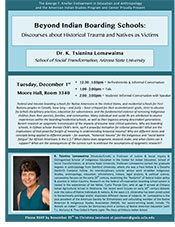
Beyond Indian Boarding Schools: Discourses about Historical Trauma and Natives as Victims
Event Information
 Event: George F. Kneller Endowment in Education and Anthropology Fall 2015 Colloquium, Cosponsored with American Indian Studies
Event: George F. Kneller Endowment in Education and Anthropology Fall 2015 Colloquium, Cosponsored with American Indian Studies
Speaker: K. Tsianina Lomawaima (Mvskoke/Creek), Professor of Justice and Social Inquiry and Distinguished Scholar of Indigenous Education, Arizona State University
Title: "Beyond Indian Boarding Schools: Discourses about Historical Trauma and Natives as Victims"
Date: Tuesday, December 1, 2015
Time: 12:30-2 pm - Light refreshments and informal conversation begin at 12:30 pm; talk begins at 1 pm
Location: Room 3340 Moore Hall (Reading Room)
RSVP: Christina Jacobson (jacobson@gseis.ucla.edu)
Note: The talk will be followed by time for students to meet informally with Professor Lomawaima (2-3 pm), Moore Hall 3340
Abstract:
Federal and mission boarding schools for Native Americans (U.S.) and residential schools for First Nations (Canada) have long – and justly – been critiqued for their assimilationist goals, strict to abusive (to lethal) disciplinary practices, education for subservience, and the fundamental violence of removing Indigenous children from their parents, families, and communities. Many individual and social ills are attributed to alumni experiences within the boarding/residential schools, as well as their legacies among descendant generations. Recent research on epigenetic transmission of the impacts of trauma raise critical questions. Why are boarding schools, in Brenda Child’s term, such a powerful metaphor for colonial genocide? What are the implications of that powerful freight of meaning in understanding historical trauma? Why are different terms and concepts being applied to different people, for example, “historical trauma” for the Indigenous and “battle fatigue” for African Americans in the U.S.? What claims does epigenetic research make, and what claims can it support? What are the consequences of the current rush to embrace the assumptions of epigenetic research?
UCLA is a tobacco-free campus. All-day parking ($12) and short-term parking (payable at pay stations) are available in Lots 2, 3 and 4 (enter the campus at Hilgard and Westholme avenues).





